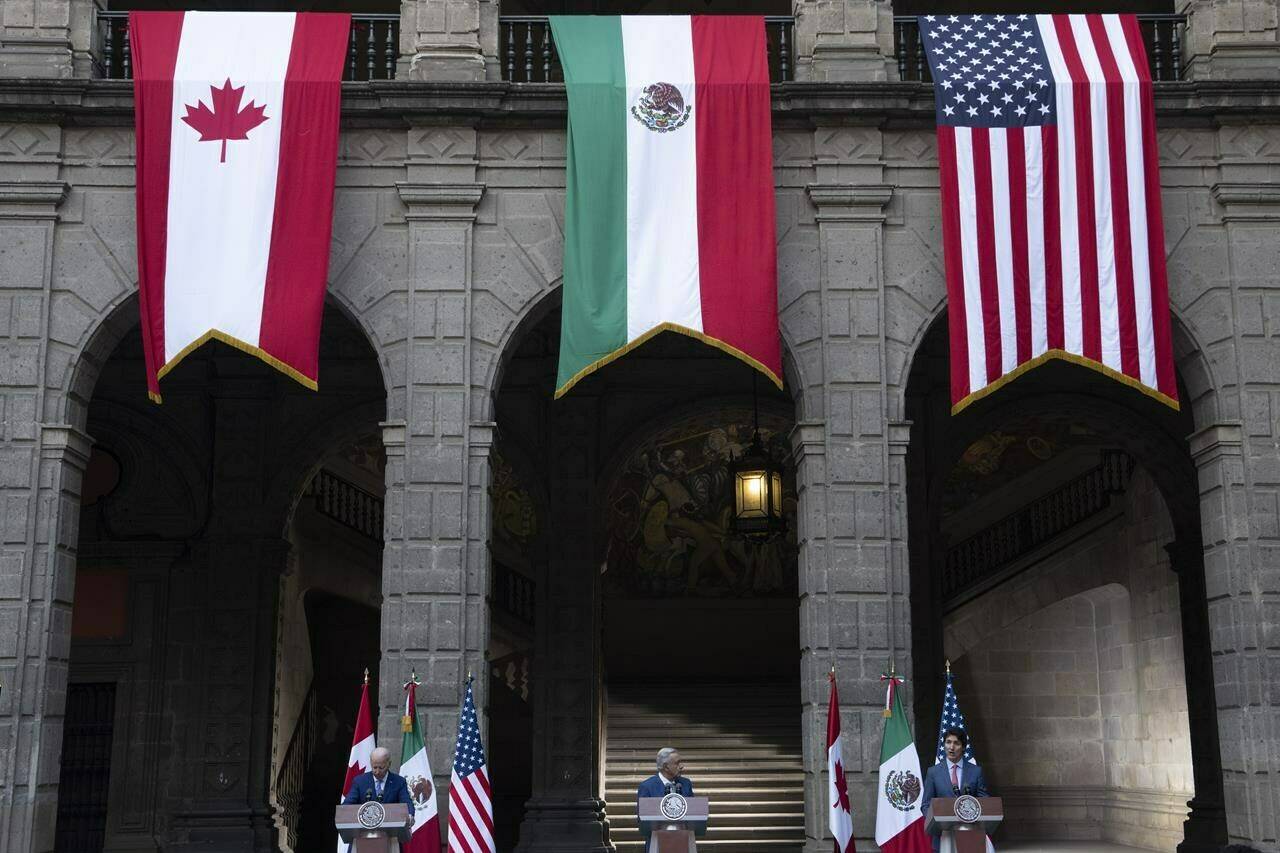The Canadian Chamber of Commerce is calling on Ottawa to conduct a charm offensive to defend Canada’s trade interests in the U.S. ahead of November’s presidential election.
The group represents businesses of various sizes across Canada, and says now is the time for a co-ordinated outreach campaign by the federal, provincial and municipal governments to protect cross-border trade.
That campaign would involve private businesses and aim to convince Americans that Canada is a boon to the U.S. economy, ahead of the scheduled review of the Canada-United States-Mexico Agreement in 2026.
“Washington has increasingly come to see its bilateral relationship as not as strategic, but as transactional,” reads a letter dated last Friday.
“It would be a terrible mistake to think that we can wait until 2025 to ensure that CUSMA is preserved.”
The group argues that thelooming presidential election will only encourage politicians to propose more protectionist policies that would sideline Canada.
When former president Donald Trump threatened to end the NAFTA agreement that had governed U.S. trade with Canada and Mexico since 1994, Ottawa launched a widescale effort to convince Americans they benefit from free trade.
Months of intense negotiation eventually landed a new deal in 2018.
The agreement, which came into force two years later, includes a “review and term extension” clause that establishes a 16-year life cycle and requires all three countries to sit down every six years to ensure all are still satisfied.
That clock began ticking in the summer of 2020.
If it runs out in 2026 without a consensus, that will trigger a self-destruct mechanism of sorts, ensuring the agreement — known in Canada as CUSMA — would expire 10 years later without a three-way consensus.
Adam Taylor, an international trade consultant with the firm NorthStar Public Affairs, says Canadian provinces and companies could partner with Ottawa to make a similar push, but he said it’s best to quietly form a contingency plan.
“People in the United States have given up on free trade, have given up on globalization and have begun to look very much inward. And that’s very much a problem for an outward, trade-reliant country like Canada,” Taylor said.
“We should be mindful of it. I think if we go on too strong a charm offensive too early, it could actually backfire, and we’d put these issues onto the radar and insert them into the political dynamics south of the border.”
Taylor, who has advised conservative governments in Canada on trade matters, said he thinks it’s likely that different levels of government with various political leanings would mount an “all-hands-on-deck approach” to protect the national economy if Washington started looking at major changes to CUSMA.
But he argued that the Liberals need to do a better job highlighting the countries’ deep ties in fields such as military and intelligence, to hedge against the possibility that Americans see Canada as just any other economic partner.
President Joe Biden has launched policies that privilege American companies over foreign businesses, which Taylor said are “virtually indistinguishable” from Trump’s.
While Biden’s administration hastweaked some of these measures after Canada warned of harm to trade flows, Taylor said both presidents have had Canadians businesses think about the possibility of CUSMA being eventually changed or even withdrawn.
Conservative MP Randy Hoback, the party’s associate trade critic who advises the party on U.S. relations, said Canada is already effectively undertaking such an approach, through the work of cross-partisan parliamentary visits to the U.S. and working groups involving legislators in both countries.
“When you have a neighbour to the south that is so big and so important to our economy, you have to always, consistently be there with aggressive ideas in regard to things that we can do together, looking for solutions and heading off problems.”
He said the Liberals could do a better job of getting their MPs to sell Canada’s brand to Americans. “I think they’ve been a little shy and they’ve been too reactive,” he said.
Hoback similarly said the business community could better collaborate with Canada’s embassy and provincial trade offices in Washington.
He said all those offices already help brief newly elected members of the U.S. Congress and Senate about the ties their regions have with Canada, including in tailored presentations by Canada’s ambassador in Washington, former trade negotiator Kirsten Hillman.
“This charm offensive, as they call it, should never stop,” said Hoback. “You have new members (of Congress) coming in all the time, who need to have that background information to understand the dynamic of the relationship.”
In its letter, the Canadian Chamber of Commerce also calls on Ottawa to have better export infrastructure such as ports and terminals for liquefied natural gas, so that Canada is able to change how it exports resources and commodities based on global demand and geopolitical shifts.
The group also wants more military spending to boost Canada’s chance of joining strategic partnerships in areas such as the Indo-Pacific.
Grantly Franklin, a spokesperson for Global Affairs Canada, said CUSMA provides for a “stable and predictable trading environment” in North America.
“Canada will continue to work through advocacy and outreach to communicate the benefits of trade and CUSMA both at home and in the U.S.,” he said in an emailed statement. “This is an ongoing effort that relies on a Team Canada approach leveraging business, provincial and territorial governments, and other (partners’) engagement with U.S. counterparts.”
READ ALSO: Five things to know about the new U.S.-Mexico-Canada Agreement
READ ALSO: Mexico imposes 50% tariff on white corn imports amid trade dispute with Canada, U.S.

